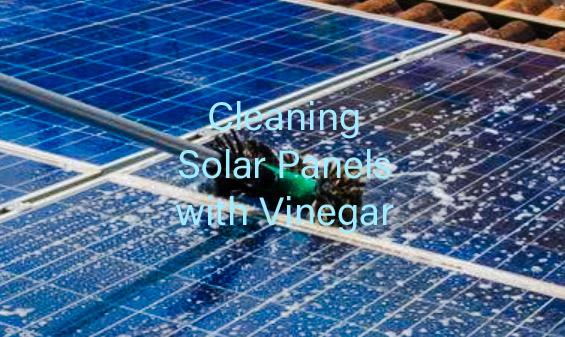While there are many commercial cleaning solutions available on the market that you can use to clean your solar panels, cleaning them with vinegar is one of the most effective and efficient methods that you can use to clean your panels.
Cleaning solar panels with vinegar is highly beneficial because it is not only eco-friendly but also cost-effective and efficient, which you can use to keep your panels clean with ease.
To effectively clean your solar panels with vinegar, you’ll need materials like white vinegar, distilled water, soft brush, etc. Once these materials are handy, you can then mix your vinegar with the distilled water and proceed with the cleaning process by rinsing the panels and applying the vinegar solution to them.
Literally, vinegar does magic in solar panel cleaning. In the subsequent sections, we’re going to see how it works and show you how you can use it to clean your panels.
Why clean solar panels with vinegar?

There are numerous reasons why you should clean your solar panels with vinegar. They are:
- Vinegar is natural, environmentally friendly, and non-toxic.
- It is very cost-effective when compared with other solar panel cleaning solutions
- It is efficient and effective solar panel cleaning solution.
Materials Needed to Clean Solar Panels with Vinegar
To efficiently and effectively clean your solar panels, the following materials are vital:
- White vinegar
- Distilled water
- Soft brush or sponge
- Spray bottle
- Hose with a gentle spray nozzle
- Squeegee or microfiber cloth, etc.
How to Clean Solar Panels with Vinegar
If you want to clean your solar panels with vinegar, follow the steps below to do that:
1. Prepare the Cleaning Solution
The first step that you will take when you want to clean your solar panels with vinegar is to prepare the solution by mixing one part white vinegar with four parts distilled water.
Although you can use any type of water, distilled water is preferable since it doesn’t contain minerals that could leave deposits on the panels. After preparation, pour the solution into a spray bottle for seamless application.
2. Rinse the Solar Panels
After preparing the solution, rinse the panels using a hose with a gentle spray nozzle to remove loose debris and dirt. This step will help prevent scratching on the panels during scrubbing.
3. Apply the Vinegar Solution on the surface of the Solar Panels
Once you are done rinsing the panels, the next thing is to spray the vinegar solution evenly over the panels. After spraying, allow it to settle for a few minutes to loosen any stubborn grime.
4. Gently Scrub the Solar Panels
After a few minutes, gently scrub the surface of the panels in a circular motion using a soft brush or sponge. Don’t use abrasive materials because they may cause scratches on the panels.
5. Rinse the Solar Panels Thoroughly
Once you’re done scrubbing, you’ll need to thoroughly rinse the panels with water to remove any remaining vinegar solution and loosened dirt.
6. Dry the Panels
Finally, once you’ve thoroughly rinsed the panels, you’ll dry them using a squeegee or a microfiber cloth. Drying it will help prevent water spots and streaks on it, enabling it to absorb enough sunlight.
N/B;
It is best to clean your solar panels with vinegar earlier in the morning or late in the evening when the temperature is cooler so that the sunlight won’t dry them before doing their magic cleaning.
Can you use vinegar to clean solar panels?
Yes, you can use vinegar to clean solar panels. In fact, it is one of the most effective and non-toxic solutions that you can use to clean your solar panels because it is natural and environmentally friendly.
Is it Safe to Clean Solar Panels with vinegar?
Yes, it is safe to clean solar panels with vinegar. Vinegar is not hazardous; it is natural and non toxic. So it is pretty safe to use it to clean your solar panels to get the best result.